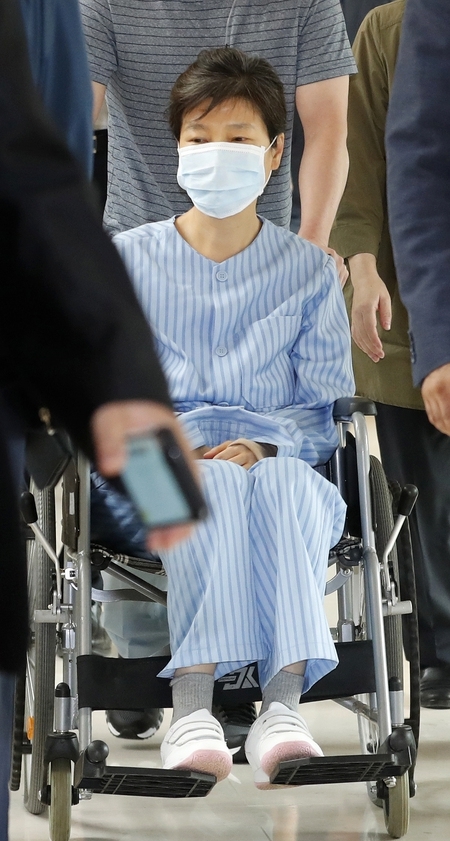Posted on : Oct.19,2017 17:48 KST
 |
|
Former President Park Geun-hye is seen leaving St. Mary’s Hospital n the Seocho District of Seoul by wheelchair after receiving treatment for back pain on Aug. 30 (Yonhap News)
|
Ministry of Justice denies allegations that former president is not receiving adequate care in jail
 |
|
Former President Park Geun-hye is seen leaving St. Mary’s Hospital n the Seocho District of Seoul by wheelchair after receiving treatment for back pain on Aug. 30 (Yonhap News)
|
An exclusive feature by CNN that former South Korean President Park Geun-hye is planning to submit to the UN Human Rights Council (OHCHR) a report claiming that she is suffering severe human rights abuses in jail has created a stir in South Korea. Park is currently on trial on charges of corruption and receiving bribes. South Korea’s Ministry of Justice and the Seoul Detention Center immediately rebutted the claims, which they say are not factual.
On Oct. 17, CNN quoted a report about human rights conditions provided by the MH Group, Park’s international legal team, as saying that Park “is living in [a] cell that's dirty, cold and constantly lit so she cannot sleep.
”
The draft report says that Park is “suffering from a handful of chronic conditions and maladies including chronic lower back pain; osteoarthritis in her knee and shoulder joints…and malnutrition,” CNN reported. It also quoted the report as saying that “Her condition is only getting worse and there is no evidence that she is receiving adequate care” and that she is sleeping on the floor.
“She is not sleeping on a proper bed, which is exacerbating chronic conditions she suffers from,” CNN reported Rodney Dixon, a British attorney with Park’s international legal team, as saying.
“Not only are beds not regarded as essential in South Korean detention facilities, but Park has been using a folding mattress since she was first detained. We do not think she has been treated inhumanely,” the Seoul Detention Center said on Oct. 18 in a rebuttal of the claims made by Park’s attorneys.
“The heating system in the cells uses the ‘ondol’ floor heating system, so these are not ‘cold floors.’ The heating in the detention center was activated about a week ago, so it’s currently not cold.” Park’s claim that it’s hard to sleep because the lights are always on in the cell was also an exaggeration, the center added.
The Ministry of Justice said that Park is also receiving appropriate medical care inside the detention center. “Park is not only being regularly examined as necessary by the medical staff at the detention center, but she is also being guaranteed appropriate and adequate opportunities for treatment. She has been examined two times, for example, at a medical clinic outside the detention center,” the Ministry said. Park received health check-ups at an external clinic on two occasions, in July and August. The result of her check-up was that she is experiencing mild degenerative symptoms due to her age.
From the time Park was taken into custody in March until now, she has in fact been accused of receiving “royal treatment” in jail, rather than suffering human rights abuses. According to documents that Roh Hoe-chan, a member of the National Assembly’s Legislation and Judiciary Committee and floor leader of the Justice Party, received from the Justice Ministry on Oct. 8 as part of the parliamentary audit, Park had met with her lawyers 148 times during the 147 days she had been in custody (as of Aug. 24).
The document also showed that she had met with correction center officials no fewer than 24 times during her detention, including 12 meetings with the director of the Seoul Detention Center – which works out to an average of once every ten days. Furthermore, the solitary cell where Park is confined is nearly twice the size of the cells used by other detainees. The Ministry of Justice said on Mar. 31 that “Park is staying in a solitary cell at the Seoul Detention Center that measures 12.01 m2 in area.”
This solitary cell was renovated for Park’s use from a cell that had been formerly shared by several inmates. Solitary cells for regular inmates have an area of 6.56 m2.
By Kang Min-jin, staff reporter
Please direct questions or comments to [
english@hani.co.kr]










